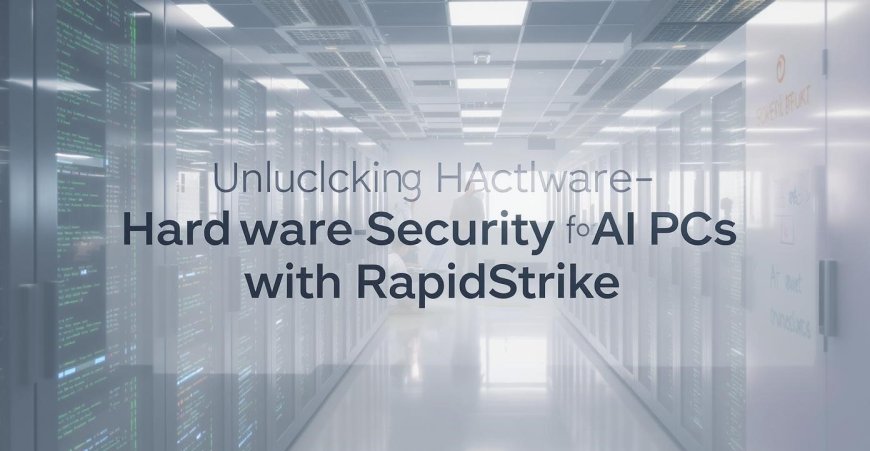Unlocking Hardware-Assisted Security for AI PCs with RapidStrike

The digital transformation of the enterprise is now being powered by AI. From edge computing devices to intelligent business applications, AI PCs are becoming central to how organizations operate and innovate. But with this evolution comes a new security challenge. TheRapidStrike webinar on Security of AI PCs / Hardware-Assisted Security, hosted by BizInfoPro, explored how hardware-level protections are emerging as the backbone of trusted AI computing.
As threats escalate and software vulnerabilities persist, the webinar emphasized that hardware-assisted security is no longer a future considerationits a critical requirement now.
Why the Security of AI PCs Is an Urgent Concern
AI PCs are not just upgraded desktops or mobile machines; they represent a new computing paradigm. By embedding neural accelerators, GPUs, and machine learning capabilities into endpoint devices, businesses can achieve remarkable on-device intelligence. But this same capability introduces complex new risks.
The RapidStrike webinar on Security of AI PCs / Hardware-Assisted Security presented a clear picture: these systems handle sensitive data, manage confidential AI models, and often operate in decentralized or unmanaged environments. Without hardware-assisted security, they become low-hanging fruit for attackers looking to exploit firmware, BIOS, or silicon vulnerabilities.
The Core Principles of Hardware-Assisted Security
At the heart of the RapidStrike webinar on Security of AI PCs / Hardware-Assisted Security was the assertion that software-only defenses are insufficient. Malware can evade endpoint agents, firmware can be silently compromised, and sophisticated attacks can occur below the OS layer.
The presenters outlined key features that distinguish hardware-assisted security, including:
-
Firmware and BIOS Protection: Secure boot technologies validate every system component before execution.
-
Secure Enclaves: Encrypted memory zones isolate sensitive workloads.
-
Remote Attestation: Enterprises can verify the integrity of AI PCs across distributed networks.
-
Hardware-Level Key Management: Secrets are stored securely within the silicon, inaccessible to malware.
These foundational features deliver trust at the lowest levels, ensuring that everything built on topdata, models, softwareis protected.
AI PCs in a Zero Trust Framework
Zero Trust architecture was a prominent topic during the RapidStrike webinar on Security of AI PCs / Hardware-Assisted Security. AI endpoints now sit at the center of business workflows, from smart kiosks to mobile analytics devices. Trusting these endpoints by default can expose enterprise networks to attack.
Hardware-assisted security provides Zero Trust with its anchor. Devices must prove their integrity through hardware-rooted identity before they are granted network access. The webinar emphasized that without this hardware-based validation, Zero Trust policies can be undermined from within.
Attendees learned how AI PCs built with embedded secure elements support:
-
Device attestation and policy enforcement
-
Automated isolation of compromised systems
-
End-to-end encryption anchored in hardware
This integration elevates security posture and ensures compliance in sensitive sectors such as finance, healthcare, and defense.
Securing the AI Lifecycle on the Edge
Another key insight from the RapidStrike webinar on Security of AI PCs / Hardware-Assisted Security was the vulnerability of the AI lifecycle itself. While most focus on model training and deployment, the real risk lies in inferencewhen AI models are active on endpoint devices.
Speakers discussed how hardware-assisted security enables:
-
Trusted execution of inference tasks
-
Protection of training datasets stored on-device
-
Detection of adversarial manipulations in runtime environments
-
Securing telemetry data fed back to the central platform
By integrating hardware protections directly into AI PCs, organizations can confidently use these devices to make mission-critical decisions, knowing their AI algorithms havent been compromised.
Real-World Deployments Shared at the Webinar
The RapidStrike webinar on Security of AI PCs / Hardware-Assisted Security wasnt just theoretical. The session featured several real-world case studies that illustrated how global organizations are deploying secure AI PCs at scale.
One case involved a European bank that used AI PCs for fraud detection at ATMs. Using hardware-assisted security, they were able to prevent BIOS-level rootkits from compromising user data. Another example came from a logistics firm that deployed AI-enabled field tablets with secure enclaves to run real-time routing algorithms. Hardware-level protections ensured the AI software could not be tampered witheven if the device was stolen.
These stories reinforced the same message: AI PCs must be designed with hardware-assisted security from day one.
Meeting Regulatory and Industry Standards
As emphasized during the RapidStrike webinar on Security of AI PCs / Hardware-Assisted Security, global regulations are evolving quickly. From the U.S. Executive Order on Improving Cybersecurity to the EUs Cyber Resilience Act, organizations are being held accountable for securing their AI infrastructure.
Hardware-assisted security isnt just good practiceits becoming a compliance necessity.
The webinar explored how features like secure boot, hardware-backed identity, and runtime integrity monitoring directly align with:
-
ISO/IEC 27001
-
NIST 800-207 (Zero Trust)
-
GDPR and HIPAA for data protection
-
Industry-specific security frameworks
This makes hardware-secured AI PCs not only technically superior but also easier to audit and certify.
Integrating AI PC Security with Enterprise IT Infrastructure
The RapidStrike webinar on Security of AI PCs / Hardware-Assisted Security also addressed an important operational question: how do enterprises integrate these AI PCs with their broader IT ecosystems?
The key is interoperability.
Hardware-assisted security features like TPMs (Trusted Platform Modules) and Intel PTT are now supported by leading enterprise platforms and cloud environments. This means AI PCs can feed secure telemetry into centralized SIEM platforms, participate in unified endpoint management, and integrate with enterprise identity systems.
Webinar speakers recommended:
-
Using attestation services during onboarding to validate AI PCs before deployment.
-
Creating automated response policies tied to hardware events (e.g., secure boot failures).
-
Ensuring firmware updates are digitally signed and pushed securely.
By embedding security into every stage of AI PC management, organizations reduce risks without compromising agility.
Preparing for Emerging Threats
A particularly compelling segment of the RapidStrike webinar on Security of AI PCs / Hardware-Assisted Security explored the future of endpoint threats. As attackers become more sophisticated, firmware-level malware and AI-targeted exploits will likely increase.
The presenters shared trends including:
-
Model theft and reverse engineering
-
Inference manipulation through poisoned data
-
Firmware supply chain attacks
-
Synthetic identity attacks at endpoint inference layers
The consensus was clear: the only way to protect against these emerging risks is to embed hardware-assisted security deep into AI PC architecture. By doing so, enterprises can take a proactive stance and make their endpoints far harder to breach.
Building a Culture of AI Security
The RapidStrike webinar on Security of AI PCs / Hardware-Assisted Security closed with a powerful message: securing AI PCs is not just a technology challengeits a mindset shift.
IT teams must collaborate with cybersecurity, AI developers, compliance officers, and procurement teams to:
-
Prioritize security during device selection
-
Ensure AI workloads are mapped to trusted hardware
-
Establish enterprise policies that mandate hardware security
-
Monitor and manage AI PCs throughout their lifecycle
The RapidStrike platform, in partnership with BizInfoPro, is enabling this cultural and technical transformation through rich knowledge-sharing and community events.
Read Full Article : https://bizinfopro.com/webinars/rapidstrike-webinar-on-security-of-ai-pcs-hardware-assisted-security/
About Us : BizInfoPro is a modern business publication designed to inform, inspire, and empower decision-makers, entrepreneurs, and forward-thinking professionals. With a focus on practical insights and in?depth analysis, it explores the evolving landscape of global businesscovering emerging markets, industry innovations, strategic growth opportunities, and actionable content that supports smarter decision?making.


































